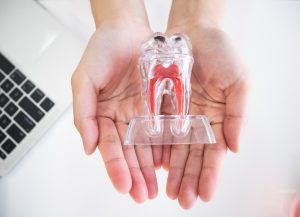Dental implants are known as the number one tooth replacement option as their design mimics the natural tooth structure. The success rate of dental implants is generally very high, with studies suggesting that up to 95% of implants are successful over the long term. However, there are still risks and potential complications that can happen as with any surgical procedure.
While the chances of experiencing complications are rare, you must understand them. We always recommend contacting our Davie, FL dentist immediately at (954) 434-3331 if you experience anything out of the ordinary during your implant treatment or in your recovery period.

Like any surgical procedure, there’s a risk of infection after dental implant surgery. Infection at the implant site, in the gum tissue surrounding the implant, or in the bone that supports the implant can occur. Symptoms of infection may include pain, swelling, redness, and pus. If you experience any of these symptoms, it is important to contact your dentist immediately.
Implant failure occurs when the implant doesn’t integrate properly with the surrounding bone or if the implant becomes loose over time. This can happen because of a variety of reasons, such as improper placement, poor oral hygiene, or a lack of bone density. In some cases, dental implant failure may require the implant to be removed and replaced.
Nerve or tissue damage can occur during dental implant placement. Nerve damage can cause pain or discomfort, numbness, or tingling in the lips, tongue, or chin. Tissue damage can lead to inflammation, bleeding, or infection. These complications can happen because of a variety of reasons, such as improper placement of the implant, poor oral hygiene, or a lack of bone density.
In some cases, dental implants placed in the front upper jaw bone can protrude into the sinus cavity, causing sinus problems such as sinus infections or sinusitis. This is more likely to occur if there’s insufficient bone to support the implant.
Some people may have an allergic reaction to the materials used in the dental implant, such as titanium or other metals. Symptoms may include itching, rashes, or even anaphylaxis in severe cases.
There are several risk factors that can increase the likelihood of experiencing complications from dental implant surgery. These risk factors can contribute to dental implant problems:
Complications that may occur after receiving dental implants include:
Always follow instructions given to you by our dentist to decrease the chances of any complications developing.
While there’s always some risk associated with any surgical procedure, there are steps you can take to reduce your risk of experiencing complications from dental implant surgery:
If you experience complications or problems with your dental implant, contact your dentist or oral surgeon as soon as possible. They can evaluate the issue and determine the best course of action, which may include additional surgery or the replacement of the implant.
To reduce the risk of infection after the implant procedure, it’s essential to maintain good oral hygiene by brushing and flossing regularly and following your dentist or oral surgeon’s instructions for post-operative care. Avoiding smoking and excessive alcohol consumption can help to reduce the risk of infection.
It’s rare for the body to reject a dental implant, as they’re typically made from materials that are biocompatible and safe for use in the human body. However, there are some cases where the body may reject a dental implant.